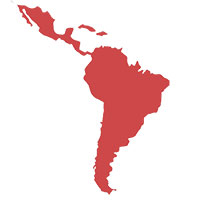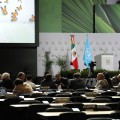Time is Running Out: Day 8 at COP16
Tim Hall | December 9, 2010.
The tired delegates and observers were given a pick-up today with the arrival of UN Secretary Ban Ki-moon.
A buzz filled the Moon Palace with the high level segment starting in the afternoon, and as more media and leaders arrive.
Meanwhile outside, demonstrators stood nose-to-nose with Mexican police and closed off roads to the negotiations.
A number of informal negotiations took place as parties attempted to refine texts in preparation for the next stage of the negotiations.
Concerns also grew over whether and how the elements of the balanced package will come together in time, given the slow progress so far.
Many negotiators have begun contemplating “Plan B” scenarios, to ensure some sort of progress if comprehensive consensus decisions cannot be reached on key issues.
Obviously aware of this, Ban reiterated a common theme throughout the conference, “We cannot let the perfect be the enemy of the good,” he stressed.
The presence of key environment ministers from around the world is hoped to speed up negotiations and create some real political decisions.
Yet only 25 world leaders are expected to make an appearance in Cancun, compared to the 120 high profile heads of states who journeyed to Copenhagen last year.
Differences still remain over a number of texts, and criticism from observers is growing louder as texts reveal weak and vague goals and commitments by parties.
In the shared vision negotiations, new text included stabilising greenhouse gas emissions at well below 350 parts per million; collectively reducing emissions by at least 50 per cent from 1990 levels by 2050; reducing emissions by developed countries by 85-95 per cent from 1990 levels by 2050 and respecting human rights.
The text came under criticism from both developed and developing nations.
In mitigation negotiations parties were pleased with progress on the text. Again divisions were evident with debates held over whether developed countries should take on mitigation “actions” or “commitments”. The legal nature of such actions and their relationship to the Kyoto Protocol also came under question.
Technology, finance, adaptation, capacity building and flexible mechanisms were also negotiated. Of note was the concern by a number of parties over the ambitious scope of the finance text, while the technology draft received strong opposition from developed countries.
With less than a week to go, it was reassured to delegates that the conference would finish at 6pm on Friday, with a complete balanced package of outcomes that will pave the way for success at Durban COP17.
Speaking to people in the hallways and on the long bus rides to the various locations, I get the sense that time is running out, and not enough is being done.
By Tim Hall, photo by Laura Owsianka.













comment